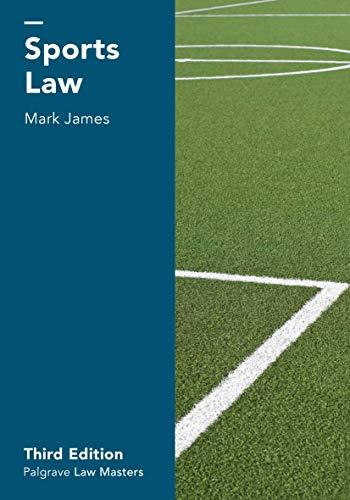Question
QUESTION 1 Which of the following is the burden of proof in criminal cases? clear and convincing evidence beyond a reasonable doubt preponderance of the
QUESTION 1
Which of the following is the burden of proof in criminal cases?
- clear and convincing evidence
- beyond a reasonable doubt
- preponderance of the evidence
- none of the above
QUESTION 2
Who has the burden of proof in criminal cases?
- the judge
- the jury
- the prosecutor
- the defendant
QUESTION 3
Protection against Double Jeopardy is found in the:
- 2nd amendment
- 3rd amendment
- 4th amendment
- 5th amendment
QUESTION 4
Which of the following has the power to nominate judges to the U.S. Supreme Court?
- the house
- the senate
- the judicial branch
- the executive branch
QUESTION 5
Which of the following does the law require for a completed crime?
- mens rea, actus reus, concurrence, proximate cause, no defenses
- mens rea, actus reus, actual cause, no defenses
- mens rea, actus reus, actual cause, concurrence, no defense
- physical and voluntary act, mental state, actual cause, no defenses
QUESTION 6
Which of the following is a list of inchoate crimes?
- assault, solicitation, conspiracy
- solicitation, arson, conspiracy
- attempt, conspiracy, solicitation
- none of the above
QUESTION 7
Which of the following is required for an actus reus?
- physical act
- voluntary act
- physical and voluntary act
- physical and voluntary act (and possibly omission to act if there is a duty to act)
QUESTION 8
Which of the following is the test for attempt under NY law?
- substantial step
- proximity test
- dangerous proximity
- last chance step
QUESTION 9
Which of the following is true for a conspiracy?
- a conspiracy is two or more guilty minds
- a conspiracy requires intent and an agreement
- a conspiracy requires an overt act
- all of the above
QUESTION 10
Which of the following is true about accomplice liability under NY law?
- an accomplice is only guilty for act he or she physically participated in
- an accomplice is guilty of all crimes, regardless of foreseeability
- an accomplice is guilty of all crimes he/she aided and abetted
- an accomplice is guilty of all crimes s/he aided and abetted, and any foreseeable crimes
QUESTION 11
Which of the following is a lawful sentence for a misdemeanor?
- 18 months
- 6 months
- 24 months
- 36 months
QUESTION 12
Which of the following branches has the power to impeach the president?
- the judicial branch
- legislative branch
- executive branch
- the president can not be impeach
QUESTION 13
Benny the 'Blade', a local drug dealer has been prosecuted and sentenced for selling narcotics in the Bronx. A second prosecution for the same charge is pending in federal court because he also sold drugs at the local post office on East 149th, the same day he was arrested for the first charge. What will the court hold regarding the second charge?
- The Double Jeopardy Clause prohibits the second offense because the offenses are part of the same sovereign
- New York and the federal government can prosecute Blade because they are separate sovereigns and thus Double Jeopardy does not apply
- No one can be charged for the same crime twice under the Double Jeopardy Clause
- Blade can only be prosecuted by New York State
QUESTION 14
Which of the following is the source of criminal law in NY?
- common law
- U.S. Constitution
- New York Penal Code
- all of the above
QUESTION 15
Which of the following is an accurate list of the mens rea under NY law?
- intent, knowledge, negligence
- purpose/intent, knowledge, recklessness, negligence
- intent, recklessness, negligence
- none of the above
QUESTION 16
Which of the following is the best definition for proximate cause?
- Was the defendant's behavior the actual cause of the injury?
- Was the defendant the indirect cause of the injury?
- Was the injury a foreseeable/natural and probable consequence of the defendant's behavior?
- none of the above
QUESTION 17
Which of the following is required to withdraw from a conspiracy?
- withdrawing from a crime requires a lack of participation from the commission of the crime
- withdrawing from a crime requires a party to notify others in a timely manner his/her intent not to participate in the crime
- withdrawing from a crime requires neutralizing the assistance such as preventing the crime, calling the police
- Both "b" and "c"
QUESTION 18
The highest court in NY State is:
- Court of Appeals
- Supreme Court
- Appellate Division
- District Court
QUESTION 19
The lowest court in federal US Court system is:
- US Supreme Court
- Court of Appeals
- Appellate Division
- District Court
QUESTION 20
Justin Bieber walked by in a park and saw Rihanna and Chris Brown having a fight in the car. Bieber is one of Rihanna's closest friends and he witnesses Chris Brown physically assaulting Rihanna by slapping her multiple times as he silently watched. What can Justin Bieber be charged with under NY law?
- he can be charged as an accomplice because he had a duty to intervene
- he can be charged with accessory after the fact because he witnessed the crime and did nothing
- he will not be charged with any crime because mere presence without a legal duty does not make him an accomplice
- none of the above
Step by Step Solution
There are 3 Steps involved in it
Step: 1

Get Instant Access to Expert-Tailored Solutions
See step-by-step solutions with expert insights and AI powered tools for academic success
Step: 2

Step: 3

Ace Your Homework with AI
Get the answers you need in no time with our AI-driven, step-by-step assistance
Get Started


